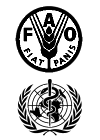
Codex Alimentarius Commission
Origin
In the nineteenfifthies the WHO and the FAO started with joined FAO and WHO expert meetings. These meetings were focused on nutrition and food safety related areas, and led to the foundation of the Codex Alimentarius Commission (CAC), who created the Codex Alimentarius in 1963. This multinational organization started to develop standards and guidelines on food quality, including safety. Later the Member States who joined the CAC agreed to adopt the Codex standards in their national food safety system or legislation, making these standards applicable all over the world. A key moment in this regards was set in 1995, when the Member States of the WTO agreed in its SPS Agreement to formally recognize the Codex Standards as reference points in international trade conflicts regarding food or feed.
How Codex works
Much information on the Codex Alimentarius and their activities can be found on its website. It does however not provide you with a compressed description on how standards are made and how one could be involved. For this one can consult the Procedural Manual. In this document you will find sections describing the different procedures that are to be followed for the standard setting. The Manual does however not clearly explain what to expect when you are involved in the process of standard setting. The following pages deal with that.
Codex Members and Observers
The Codex Alimentarius exist of Member States, Observers and the Codex Secretariat. In 2020 there were 189 Codex Members and one Member Organization (the European Union). The Codex list shows for each Member information of the Codex Contact Point. The Codex Contact Point plays an essential role in the Codex procedures; this organization/person gets the information of the Codex Secretariat and forwards that to the people involved. The Contact Point is also responsible for inviting persons for the Codex meetings where the proposals for standards are being discussed.
The Observers are non-governmental and intergovernmental organizations. They can participate in the process of standard setting and are allowed to comment on proposals, but have no votes in contrast to the Members. The Codex website provides a list of observers and a description of how to become a Codex Observer.
